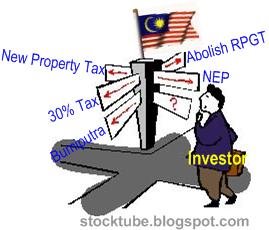The RPGT has long been seen as an “unnecessary” obstacle to the nation’s attempt to attract more foreign direct investment. News reported that doing away with the  RPGT will spur foreigners to snap up our property as they would not have to worry about having to pay a flat 30% RPGT when they sell it off in say, one to five years’ time.
RPGT will spur foreigners to snap up our property as they would not have to worry about having to pay a flat 30% RPGT when they sell it off in say, one to five years’ time.
There are also those who feel that doing away with the RPGT will not have a big impact, as generally people do not dispose of their property within the first five years. I agreed that the abolishment of the RPGT will brings some relief and excitement to the property market but it will not bring the crazy-rush to the already over-supply market.
You simply have to relook back at the previous 1993-94 Super-Bull run period where the speculators were seen snapping properties as if it’s buy-1-free-1 sales. The main difference between now and then was the cash flow that individual possess. Back then; people were making money almost daily from the stock market. Everybody were trading without money – the fact that they traded within T+7 (you only settle the trading amount on the seventh day from the transaction date) and still makes good money created an illusion that they’ve finally found the ultimate money-making machine. And when you and any of your friends who have not even graduated from high-school or college are making money more than a company’s director paycheck, you’re simply hooked to the system.
When these people were making money continuously from the stock market, it created an instant wealth, so much so that they actually do not know where to park their money. Property was their next target – so people started to snap-up any new project being launched. Queuing for nights just to get hold of the property was a normal process then. Most of them are not first time buyers – they’re buying it for investment hoping to get rid of it immediately when there’s a buyer. Property’s price skyrocketed because the overwhelming demands versus supplies. It thus created a bubble (when the 1997 crisis arrived).
Forward to the future – the year 2006-07. Stocks were said to be in the bull-run starting in the 4th quarter of 2006 but tons of people brushed it off as the sign for an early general election. Some of the unhealthy-signs:
-
FDIs (foreign direct investment) are not flowing in
-
Inflation skyrocket because the government decided to let the burden of oil-price’s hike to be shouldered by the people on the street
-
Property is over-supply
-
High unemployment were seen for the first time
-
Global economy uncertainties
-
Local private companies are stagnant locally and chose to expand overseas due to obvious reason
What worries industry players and the home-buying publics are the “constant ad-hoc changes” in policies that not only confuse investors and homebuyers but also may actually backfire and cause the property market to crash if the goodies given are suddenly taken away. It’s a norm in Malaysia that whenever the government needs you, you’re given the carrot but once you’re done with your contribution, the carrot will be taken away – worst still you’re punished for theirs’ own incompetence (such as locking in your investment profit from taken out).
Other Articles That May Interest You …

|
|
March 23rd, 2007 by financetwitter
|


|

|

|

|

|

|





























Comments
Add your comment now.
Leave a Reply